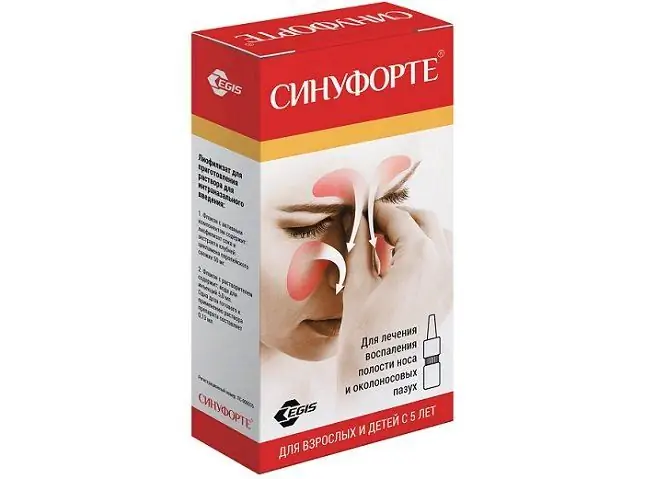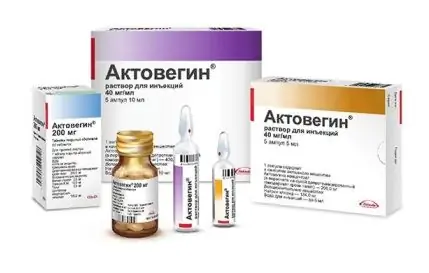- Author Rachel Wainwright wainwright@abchealthonline.com.
- Public 2023-12-15 07:39.
- Last modified 2025-11-02 20:14.
Urosept
Urosept: instructions for use and reviews
- 1. Release form and composition
- 2. Pharmacological properties
- 3. Indications for use
- 4. Contraindications
- 5. Method of application and dosage
- 6. Side effects
- 7. Overdose
- 8. Special instructions
- 9. Application during pregnancy and lactation
- 10. Use in childhood
- 11. In case of impaired renal function
- 12. For violations of liver function
- 13. Use in the elderly
- 14. Drug interactions
- 15. Analogs
- 16. Terms and conditions of storage
- 17. Terms of dispensing from pharmacies
- 18. Reviews
- 19. Price in pharmacies
Latin name: Urosept
ATX code: J01MB04
Active ingredient: pipemidic acid (Рipemidic acid)
Manufacturer: Lekhim-Kharkov, JSC (Ukraine)
Description and photo update: 2019-09-07

Urosept is a drug used to treat infectious and inflammatory diseases of the genitourinary tract.
Release form and composition
Dosage form - suppositories: bullet-shaped, white or white with a yellowish tinge; on the surface of the suppository, the presence of plaque is permissible (in a cardboard box there are 2 blisters of 5 suppositories and instructions for the use of Urosept).
Composition of 1 suppository:
- active substance: pipemidic acid trihydrate (in terms of dry matter) - 200 mg;
- auxiliary component: solid fat.
Pharmacological properties
Pharmacodynamics
Pipemidic acid is a uro-antiseptic of the quinolone series. It has a bactericidal effect, is active against most gram-negative microorganisms, as well as against some gram-positive microorganisms, including Staphylococcus aureus (Staphylococcus aureus).
Pharmacokinetics
After intravaginal or rectal administration of the drug, C max (maximum concentration of the substance) in blood plasma is determined after 2-3 hours and coincides in time with the achievement of C max in urine.
Pipemidic acid is excreted unchanged by the kidneys.
Indications for use
Urosept is prescribed for the treatment of infectious and inflammatory diseases of the genitourinary system caused by microorganisms exhibiting sensitivity to pipemidic acid, including urethritis, pyelonephritis, prostatitis, cystitis.
Contraindications
Absolute:
- severe renal dysfunction (in patients with creatinine clearance less than 10 ml / min);
- cirrhosis of the liver;
- severe liver dysfunction;
- porphyria;
- diseases of the central nervous system, including epilepsy, neurological conditions, accompanied by a reduced seizure threshold;
- pregnancy and lactation;
- age up to 18 years;
- individual intolerance to the components of the drug, as well as other quinolones.
Relative (Urosept is prescribed under medical supervision):
- deficiency of glucose-6-phosphate dehydrogenase (associated with the likelihood of an acute hemolytic crisis);
- old age (since in this group of patients the development of side effects is observed more often).
Urosept, instructions for use: method and dosage
Urosept is used intravaginally or rectally.
Recommended dosage: 2 times a day, 1 suppository for 10 days. According to indications, the frequency of application can be increased up to 3 times a day.
In order to remove the suppository from the package, pull the edges of the film, tearing it in different directions.
Side effects
Possible adverse reactions [> 10% - very common; (> 1% and 0.1% and 0.01% and <0.1%) - rarely; <0.01% - very rare]:
- blood and lymphatic system: rarely - eosinophilia; in case of impaired renal function and in elderly patients - reverse thrombocytopenia; against the background of glucose-6-phosphate dehydrogenase deficiency - hemolytic anemia;
- digestive system: pain in the epigastric region, anorexia, heartburn, vomiting, nausea, abdominal pain, flatulence, constipation or diarrhea; rarely - pseudomembranous colitis;
- psyche: confusion, depression, agitation, hallucinations;
- nervous system: sleep disturbances, tremors, sensory disturbances, dizziness; very rarely - vertigo, convulsions, headache;
- visual system: visual impairment;
- musculoskeletal system: tendonitis, acute arthropathy;
- skin and subcutaneous tissue: hypersensitivity reactions, including photosensitivity, skin rash, itching, Stevens-Johnson syndrome; rarely - angioedema;
- local reactions: pain, irritation, itching at the injection site of the suppository;
- others: rarely - development of resistance, weakness, superinfection.
Skin reactions are reversible, there is information about the development of anaphylactic responses. Due to the existing likelihood of cross-sensitivity to other quinolone antibiotics, caution is required when prescribing Urosept to patients with a history of indications of an anaphylactic reaction to any quinolone.
In case of signs of hypersensitivity reactions, toxic epidermal necrolysis, anaphylactic shock or seizures, Urosept is immediately canceled.
Overdose
- the main symptoms of a pipemidic acid overdose: vomiting, nausea, headache, dizziness, confusion, convulsions and tremors;
- therapy: in case of loss of consciousness, vomiting should be induced, the stomach should be washed, activated charcoal is prescribed. Pipemidic acid is excreted by hemodialysis (90% of the dose in 6 hours). If there are side effects from the central nervous system (including the development of epileptiform seizures), symptomatic treatment is performed (the use of diazepam is indicated).
special instructions
During the period of therapy, you must drink plenty of fluids.
In some cases, the use of Urosept can lead to seizures, therefore, the drug is not prescribed to patients with epilepsy and other neurological diseases with a reduced seizure threshold.
Against the background of porphyria, there is a risk of developing an acute porphyrin crisis, as a result of which Urosept is contraindicated in this group of patients.
During the use of the drug, direct sunlight and artificial ultraviolet radiation should be avoided, which is associated with the possible development of photosensitization.
Consideration should be given to the likelihood of superinfection caused by persistent fungi and bacteria.
When a patient develops diarrhea, it is necessary to take into account that in the case of prolonged use of pipemidic acid, pseudomembranous colitis may develop.
During the period of therapy, a false positive reaction to glucose in the urine is possible.
Allergic reactions are most often observed in persons who are hypersensitive to acetylsalicylic acid.
Influence on the ability to drive vehicles and complex mechanisms
During the period of use of Urosept suppositories, driving should be abandoned.
Application during pregnancy and lactation
The drug Urosept is not prescribed during pregnancy / lactation.
Pediatric use
In children and adolescents, the use of suppositories can affect the temporary cartilage tissue.
Urosept is not prescribed for patients under 18 years of age.
With impaired renal function
In patients with creatinine clearance less than 10 ml / min, the use of Urosept suppositories is contraindicated.
For violations of liver function
It is contraindicated to prescribe Urosept to patients with liver cirrhosis and severe hepatic impairment.
Use in the elderly
Elderly patients should use Urosept suppositories with caution.
Drug interactions
- theophylline: with long-term combined use, its serum concentration in the blood increases significantly (on average by 40-80%), which is associated with prolongation of the half-life; with simultaneous administration, more frequent monitoring of serum theophylline concentration is necessary;
- caffeine: its serum concentration increases (possibly 2-4 times);
- warfarin, rifampicin, cimetidine: their therapeutic effect is enhanced;
- non-steroidal anti-inflammatory drugs: the likelihood of seizures increases;
- aminoglycosides: there is a synergistic bactericidal effect;
- antacids (containing magnesium, calcium and aluminum), sucralfate: the absorption of pipemidic acid is significantly reduced, therefore, a break of 2-3 hours should be observed between the use of these drugs and Urosept; a similar effect is not observed with simultaneous use with ranitidine and cimetidine.
Analogs
Urosept analogs are Urotractin, Uropimide, Pipelin, Palin, Pipegal, Pipemidic acid, Pipem, Pimidel, etc.
Terms and conditions of storage
Store at temperatures up to 25 ° C in original packaging. Keep out of the reach of children.
The shelf life is 3 years.
Terms of dispensing from pharmacies
Dispensed by prescription.
Reviews about Urosept
Patients rarely leave reviews about Urosept. Most often it is indicated that since the drug is prescribed as part of the complex treatment of diseases of the genitourinary tract, in particular cystitis, it is not possible to assess its effectiveness.
Price for Urosept in pharmacies
The price of Urosept is unknown, since the drug is not available in pharmacies.
The approximate cost of analogues: Palin (20 capsules 200 mg each) - 223 rubles; Pipemidic acid (20 capsules 200 mg each) - 314 rubles.

Maria Kulkes Medical journalist About the author
Education: First Moscow State Medical University named after I. M. Sechenov, specialty "General Medicine".
Information about the drug is generalized, provided for informational purposes only and does not replace the official instructions. Self-medication is hazardous to health!






